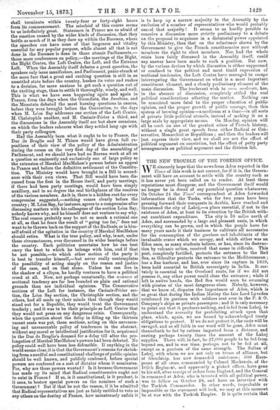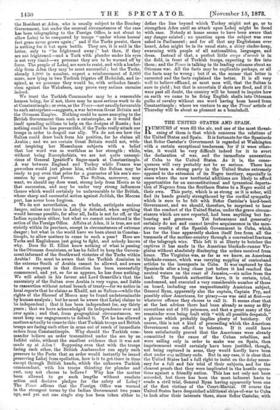THE NEW TROUBLE OF THE FOREIGN OFFICE.
WE sincerely hope that the news from Aden reported in the Times of this week is not correct, for if it is, the Govern- ment will have an account to settle with the country such as it has never yet been called on to render. At least three reputations must disappear, and the Government itself would no longer be in dread of any parochial question whatsoever. On October 24 the Times' correspondent at Men forwarded information that the Turks, who for two years have been pressing forward their conquests in Arabia, have reached and threatened the city of Lahej,—a place essential, if not to the existence of Aden, at least to its retention by the British with- out exorbitant expenditure. The city is 38 miles north of Aden, and surrounded by a large and pleasant oasis, in which everything can be grown, and in which the people have for many years made it their business to cultivate all necessaries for the consumption of the garrison and inhabitants of the invaluable crater which we occupy, and which either was an Eden once, as many students believe, or has, since its destruc- tion by volcanic action, received that name in ridicule. This post, completely fortified, protects the entrance to the Red Sea, as Gibraltar protects the entrance to the Mediterranean ; has a fine harbour, and has, ever since its capture in 1839, been held essential to British sovereignty in India. It cer- tainly is essential to the Overland route, for if we did not possess it, any other power could close the entrance ; while if left in native hands, the Red Sea would soon be swarming with pirates of the moat dangerous class. Nobody, however, that we know of, disputes the importance of Aden, which is so great that during the Indian Mutiny the late Lord Lyveden reinforced its garrison with soldiers sent over in the P. & 0. Company's ships as private passengers ; and it is only necessary to point out that it produces nothing, and is fed from Lahej, to understand the necessity for prohibiting attack upon that place, which, again, we are bound by acknowledged treaty obligations to protect. If we do not protect it, the oasis will be ravaged, and as all faith in our word will be gone, Aden must thenceforth be fed by rations imported from a distance, and costing perhaps twenty times the amount of the Lahej supplies. There will, in fact, be 27,000 people to be fed from beyond sea, and in war time, perhaps, not to be fed at all, except as a garrison of the same strength. The Sultan of Lahej, with whom we are not only on terms of alliance, but of friendship, has now demanded assistance ; 500 Euro- peans of all arms, commanded by Colonel Mackenzie, of the 105th Regiment, and apparently a picked officer, have gone to his aid, after receipt of orders from England, and the General in command at Aden, who is invested with all political power, was to follow on October 28, and have an interview with the Turkish Commander. In other words, improbable or impossible as the statement will look, we may at this moment be at war with the Turkish Empire. It is quite certain that
the Resident at Aden, who is usually subject to the Bombay Government, but under the unusual circumstances of the case has been telegraphing to the Foreign Office, is not about to allow Lahej to be conquered by troops " under whose horses' feet grass never grows again ;" and if the Turks persist, there is nothing for it but open battle. They are, it is said in the letter, only to " be frightened away ;" but then, if they are not frightened—and a Turk with plunder under his eyes is not very timid—we presume they are to be warned off by force. The people of Lahej are sure to resist, and with a leader- ship from Aden they may be most successful ; but the Turks, already 1,000 in number, expect a reinforcement of 2,000 more, now lying in two Turkish frigates off Hodeidah, and in- spired, as we presume they would be, with orthodox fanati- cism against the Wahabees, may prove very serious enemies indeed.
We trust the Turkish Commander may be a reasonable human being, for if not, there may be most serious work to do at Constantinople; or even, as the Times—not usually favourable to such enterprises—suggests, a war between Great Britain and the Ottoman Empire. Nothing could be more annoying to the British Government than such a catastrophe, as it would find itself spending millions to help on the designs of Russia ; but nothing could be less preventible, if the Turks really attack our troops in order to despoil our ally. We do not see how the Sultan could draw back from his position, for he claims all Arabia ; and we are certain Great Britain would not, with- out inspiring her Mussulman subjects with a belief that her word was as worthless as her strength ; while, without being Russophobists, we are not quite unsuspi- cious of General Ignatieff's finger-mark at Constantinople. A war between England and Turkey while France was powerless would just please him, while the Sultan may be ready to pay even that price for a guarantee of his son's suc- cession by one great Power. The Sultan, moreover, may want, we should say does want, strong help from Mecca as to that succession, and may be under very strong influences thence which would certainly be unfavourable to the British, whose sharp and successful action against Jeddah, the Meccan port, has never been forgiven.
We do not nevertheless, on the whole, anticipate serious danger, unless our force in Lahej is defeated, when anything would become possible, for after all, India is not far off, or the Indian squadron either, but what we cannot understand is the action of the Foreign Office. Affairs at Aden, it is true, are not strictly within its province, except in circumstances of extreme danger ; but what in the world have we been about in Constan- tinople, to allow matters to come to such a pass ? Here are Turks and Englishmen just going to fight, and nobody knows why. Does Sir H. Elliot know nothing of what is passing in the Ottoman dominions, or has he failed to keep the Govern- ment informed of the Southward victories of the Turks within Arabia? He must be aware that the Turkish dominion in the extreme South of Arabia cannot be allowed, and aware that a conquest in that direction has been successfully commenced, and yet, so far as appears, he has done nothing. We will admit in his favour and Lord Granville's that the suzerainty of the Sultan over Arabia is very vague, and liable to reassertion without actual breach of treaty—for we notice in local reports that he claims as Khalif, not as Sultan—while the rights of the Shereef of Mecca may be found undeterminable by human analysis ; but he must be aware that Lahej claims to be independent ; that it has been independent for, say thirty years ; that we have acknowledged its independence over and over again ; and that, from geographical circumstances, we must keep our engagements to defend it. Yet he has allowed matters actually to come to this : that Turkish troops and British troops are facing each other in arms out of reach of immediate orders from Constantinople. Why should the Turkish com- mander believe an order transmitted under the sea by an Infidel cable, without the smallest evidence that it was not made up at Aden ? Supposing even that with the troops facing each other, the British Ambassador can apply such pressure to the Porte that an order would instantly be issued preserving Lahej from spoliation, how is it to get there in time except through British hands, which the unknown Turkish commandant, with his troops thirsting for plunder and rest, may not choose to believe ? Why has the matter been allowed to go such lengths without resolute action and decisive pledges for the safety of Lahej ? The Times affirms that the Foreign Office was warned in the strongest terms by the Indian Government two years ago, and yet not one single step has been taken either to define the line beyond which Turkey might not go, or to strengthen Aden until an attack upon Lahej might be faced with ease. Nobody at home seems to have been aware that any danger existed ; no question upon the subject was ever asked in Parliament ; and for all that any Englishman ever heard, Aden might be in its usual state, a shiny cinder-heap, swarming with people of all nationalities, languages, and dress. Instead of that, a perfect little corps d'armee is in the field, in front of Turkish troops, expecting to fire into them; and the Times is talking in its leading columns about an Ottoman war. All the facts may be explicable perhaps, or all the facts may be wrong ; but if so, the sooner that letter is corrected and the facts explained the better. It is all very well to believe offhand, as most men will, that the Sultan is sure to yield ; but that is uncertain if shots are fired, and if it were past all doubt, the country will be bound to inquire how on earth we came to be firing English shells into Ottoman pulks of cavalry without one word having been heard from Constantinople ; where we venture to say the Times' article of Thursday will be about as pleasant as a bombshell.



































 Previous page
Previous page